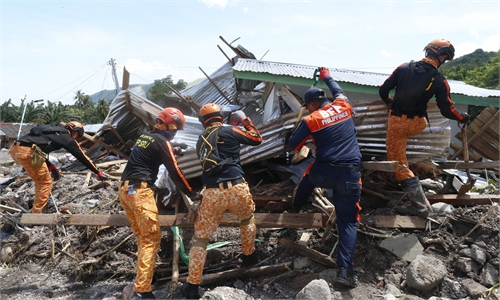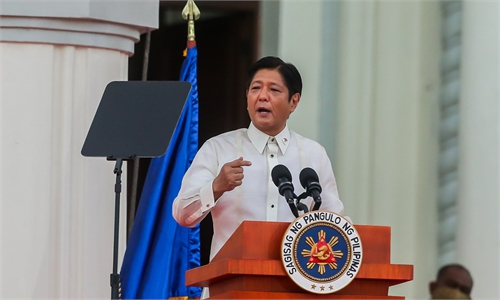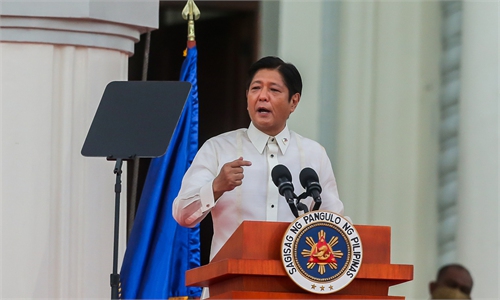
Philippine President Ferdinand Marcos Jr delivers a speech during his visit to a vaccination site in Manila on August 1, 2022.Photo: AFP
Philippine President Ferdinand R. Marcos, Jr. will be going to the People's Republic of China on January 3, 2023 on his first state visit reaffirming Philippine ties with China which he has described the "strongest partner" of his country. In 1974,he accompanied mother First Lady Imelda R. Marcos to meet Chairman Mao Zedong paving the way toward establishing diplomatic relations for the two countries in 1975.Marcos, Jr.'s visit did push through despite a last quarter surge of anti-China smears by the pro-US factions across the Philippine government, political and media bureaucracy, seeking to rake up spurious and outright fake news to disrupt Philippine-China relations: from distorting an innocent Chinese Coast Guard retrieval of "space debris" to dissemination of a Bloomberg fake news on "new reclamations" by China in the South China Sea and the hyped "COVID surge" in China that allegedly may harm Marcos Jr. in his visit.
Some Filipino politicians, foreign policy and defense officials have the immature notion that their muckraking against China is leverage to gain more concessions from China, but such a penny ante attitude exposes the juvenile state of mind of these officials. China's venerable art of diplomacy transcends such childish small-stake diplomacy with a strategic and visionary sense.
President Marcos, Jr. is totally unlike his predecessor President Rodrigo R. Duterte who wears his "heart on his sleeve." Many are faulting Marcos Jr. today for being too much of "Mr. Congeniality" with the warmonger disguised as "democracy policeman", the United States of America, who continues to meddle in Asia and the South China Sea. This congeniality to the 20th century rogue state has thinned the perception of the Philippines' progressive regional political and geopolitical leadership since Duterte.
The projection of amiability has weakened the much-vaunted "balancing" policy, throwing it off-balance with: the addition of five more US military bases in the Philippines, on top of the five already in place under the Enhanced Defense Cooperation Agreement (EDCA), more aggressive PHL-US military drills closer to flashpoints near Taiwan island and the South China Sea disputed areas, and the increasingly offensive rhetorical emissions of the Philippines' Department of Foreign Affairs and Department of National Defense.
All these acts of congeniality toward the US' militaristic activities upset the balance and is turning the Philippines' foreign policy into a gyrating spinning top swerving wildly and wobbling as the spin falters on the most crucial diplomatic issue of relations with China and the US. The increased US militaristic intervention in Philippine security affairs hurts Philippine and ASEAN interests more than the Marcos Jr. administration apparently understands.
It's imperative to correctly understand the logic of "balancing" as ASEAN countries see it: balancing by itself is a "separation" from the weight of 20th century US and Western domination, in the same manner former Philippine President Duterte described his action vis-à-vis the US. The Philippines' national interest and ASEAN's regional interest is to keep that weight off to be free to pursue peace and prosperity - militarization of the region by external powers is inimical to those interests.
An example of the unsavory foreign policy practice is the Philippine Department of Foreign Affairs boasting of its "diplomatic protests" over mainly imagined Chinese SCS transgressions - but foreign and local anti-China cheerleaders applaud it. There are some saving graces, the "independent foreign policy" community see "great significance" in the Marcos trip as the first bilateral visit to a non-ASEAN country, affirming the preeminence of the Asian ties.
The most significant opportunity is the personal meeting of Marcos Jr.'s with President Xi Jinping where trust and confidence can be rekindled for President Marcos Jr. to bring back home and breathe new life, sincerity and vigor to the Philippines' commitment to the "comprehensive strategic cooperation" with its "strongest partner" China. Thus, the millennial friendship and brotherhood of the two nations continues into the era's Asian Century and toward the world's quest for peace.
The author is founder of a Manila-based think tank Philippine BRICS Strategic Studies. opinion@globaltimes.com.cn



